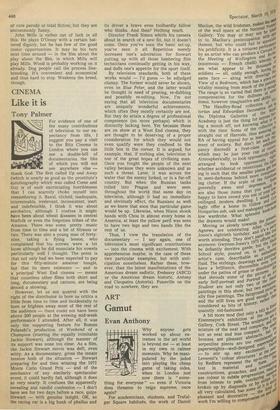CINEMA
Like it is Tony Palmer
For evidence of one of the many contributions of television to our ex pectancy from life, I suggest you pay a visit to the Ritz Cinema in London where you can see a double-bill of documentaries the like of which you will not see anywhere else — thank God. The first called Up and Away (which is nearly as good as the prostitute's autobiography which was called Come and Go) is of such excruciating horribleness that I can scarcely choke myself into remembering it. Banal, cliched, inadequate, interminable, irrelevant, inconsistent, inert and indefensible, I think it was about aerobatics, although I confess it might have been about wheat diseases in central Norfolk or even the forgotten tribes of the Amazon. There was some pretty music from time to time and a bit of Strauss or two. There was also a young man of fortynine, taking a flying lesson, who complained that his screws were a bit loose although he did enunciate his vowels particularly well I thought. The point is that not only had we been expected to pay for this fifty-minute amateur bungle, but that its mere existence — and in a principal West End cinema — means that countless other films both short and long, documentary and cartoon, are being denied a showing.
However, let us not quarrel with the right of the distributor to bore us critics a little from time to time and incidentally to bore or frighten away most of the rest of the audience — there could not have been above 300 people at the evening mid-week performance I attended. After all, it was only the supporting feature for Roman Polanski's production of Weekend of a Champion (starring the equally inimitable Jackie Stewart), although the manner of its support was none too clear. As a film, the Jackie Stewart movie was deft, even witty. As a documentary, given the innate tension both of the situation — Stewart preparing for and then winning the 1971 Monte Carlo Grand Prix — and of the mechanics of any similarly spectacular event, it could hardly fail, although it does so very nearly. It confuses the apparently revealing and candid confession — I don't have sex for two days before a race, quips Stewart — with genuine insight. OK, so the racing car is a big hunk of phallus and its driver a brave even foolhardly fellow who thinks. And then? Nothing much.
Director Frank Simon whirls his camera about in search of a new fix, but it doesn't come. Once you've seen the basic set-up, you've seen it all. Repetition merely increases one's admiration for Stewart putting up with all those lumbering film technicians continually getting in his way, and dulls one's appetite for the sport itself.
By television standards, both of these works would — I'd guess — be adjudged clumsy. The former would never be shown, even on Blue Peter, and the latter would be thought in need of pruning, re-dubbing and possibly re-editing. Now, I'm not saying that all television documentaries are uniquely wonderful achievements, which often they mostly certainly are not. But they do attain a degree of professional competence (no more perhaps) which is distinctly lacking here. Yet because these are on show at a West End cinema, they are thought to be deserving of a proper consideration for which they would not even qualify were they confined to the little box in the corner. It is argued, for example, that, if nothing else, television is one of the great hopes of civilising man. Once you fought the people of the next valley because they were unknown and as such a threat. Later, it was across the water that the enemy lurked, or in a far-off country. But when the Russian tanks rolled into Prague and were seen throughout the world that same day on television, although it had no immediate and obviously effect, the Russians as well as we knew that soon that particular game would be up. Likewise, when Nixon shook hands with Chou in almost every home in America, at least the yellow peril was seen to have two legs and two hands like the rest of us.
Thus, I view the translation of the documentary — I say again, one of television's most significant contributions — into the cinema with excitement. With apprehension maybe, in the case of these two particular examples, but with anticipation nonetheless. Rather these, however, than the latest manifestations of the American dream sadistic, Embassy (ABC2) or the American dream historic, Antony and Cleopatra (Astoria). Funsville on the road to nowhere, they are.










































 Previous page
Previous page